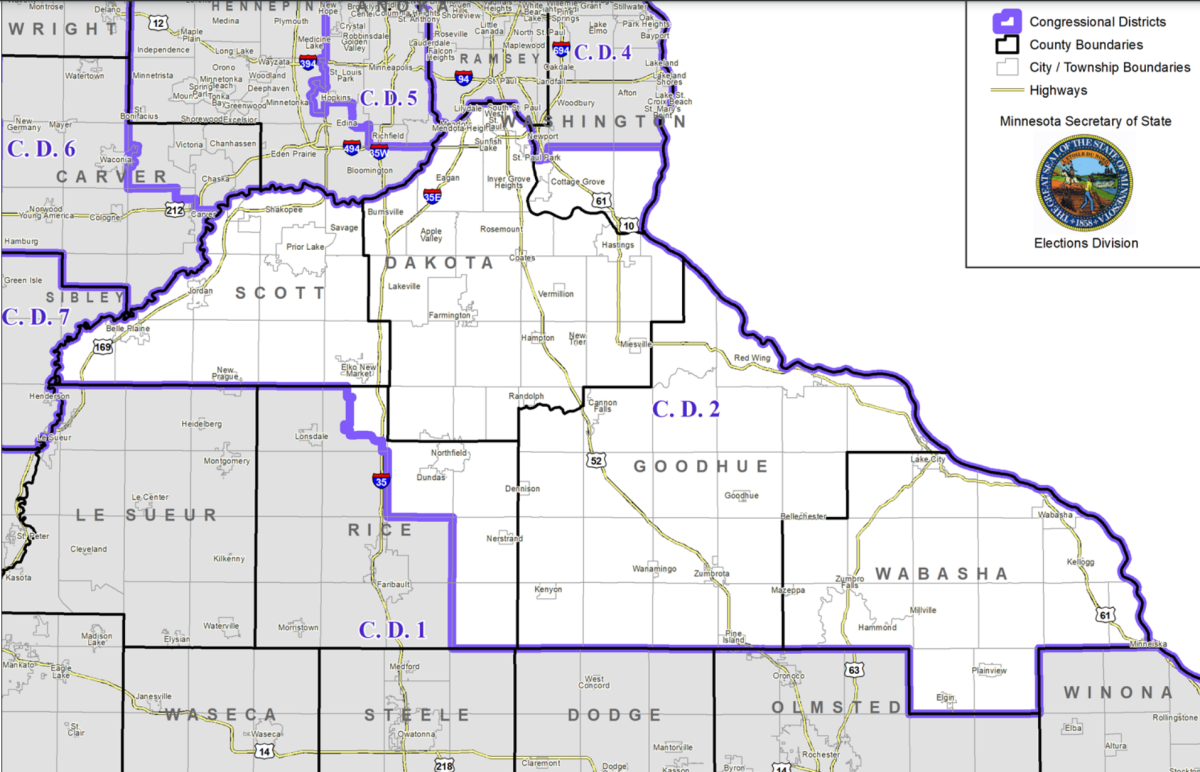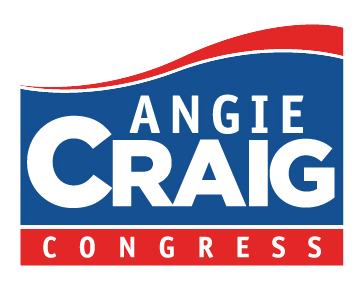By: Jackie Renzetti
10/20/2020
Bring Me The News is looking at each of Minnesota’s nine congressional races (nine House, one Senate) in the lead-up to Nov. 3.
Today we look at the 2nd Congressional District, which begins in the southeastern Twin Cities suburbs and extends south along the Minnesota-Wisconsin border.
Who’s running?
- Rep. Angie Craig (D) (Incumbent; elected 2018)
- Tyler Kistner (R)
Adam Weeks, who ran with the Legal Marijuana Now party, died Sept. 21. His name will still appear on the ballot. The party has nominated Paula Overby to take his place in the event of a special election, which is not currently planned.
District map

What happened last time?
Rep. Angie Craig won by a 5.6% margin over then-incumbent, former Rep. Jason Lewis. She became the first woman to represent the district, and is also Minnesota’s first openly gay representative as well as the country’s first openly lesbian mother elected to Congress. In 2016, Lewis won the vacant seat with a 1.8 percentage point margin over Craig.
The race so far:
This year’s race has been thrown into turmoil following the death of Legal Marijuana Now candidate Adam Weeks death. Craig is pushing for the election to take place Nov. 3 as planned, and Kistner argues that they should follow the 2013 state law requiring a special election in February.
After Weeks’ death, Minnesota Secretary of State Steve Simon advised that, thanks to a 2013 state law spurred by questions left by Sen. Paul Wellstone’s death days before the 2002 election, the election would have to be postponed to February. In the interim, between the end of her term in mid-January and until the new election date, Feb. 9, the Congressional seat would be vacant.
Citing this vacancy as a key concern, Craig filed a lawsuit to block the delay. On Oct. 9, a federal judge ruled that the state law is preempted by federal law, requiring the election to stay on schedule.
Kistner has appealed the decision, arguing that the original postponement prompted him to cancel TV advertisements and other campaign efforts, and that it caused too many voters to skip the race on their ballots. Voters can request back absentee ballots through Oct. 20 to correct them. The Secretary of State has issued a statement advising voters to continue to vote in this race.
The Legal Marijuana Now party is also arguing for a February election. If this happens, their nominee Overby would appear on the ballot. Overby also ran Independent for the same seat in 2016. It should be noted that a vote for Weeks will not count for anyone other than Weeks.
A delayed race would add multiple factors into the election, including possible lower turnout because it will not be tied to the presidential election as well as extended campaigning time and of course the vacant seat between the end of January and beginning of February. The Star Tribune has more reporting here digging into how timing of the election will impact this race.
Craig has raised close to $5 million according to the latest FEC filings; Kistner has raised more than $2 million.
Overall, a Democrat victory has been predicted by leading polling organizations for the entirety of the race. Still, it has been one of the most closely watched Congressional races in what has been considered a swing district in the last few elections.
Where do the candidates stand?
The candidates have so far participated in two debates: one held by Dakota County Regional Chamber of Commerce, and one via MPR News. A third debate will be broadcast Friday on TPT (this was postponed by one week after Kistner’s baby was born).
They offer strikingly different approaches to governing; issues centered at debates so far have included healthcare, climate change and the government’s coronavirus response, according to the Minnesota Reformer and MPR News.
On climate change:
- Kistner: “I believe in the science and I see the climate is changing, but I’m not here to sacrifice the American economy on the altar of climate change.”
- Craig: “I don’t think for one minute that we have to choose addressing carbon emissions in this country and the changing climate over economic growth.”
On healthcare:
- Kistner: Says he wants to “offer patients more choices, rein in skyrocketing costs, improve quality, and expand access to care” on his website. At the first debate, he said he supports proposals that would allow other countries to import prescription drugs.
- Craig: Says she wants to build on the ACA. She has long advocated for a buy-in option for Medicare, allowing Americans younger than 65 to purchase a plan, rather than pushing for a universal healthcare plan.
On the coronavirus:
- Kistner: At the second debate, Kistner said he supports limited financial rescue steps by the federal government. “The place we need to be focused is on providing relief to those who are most affected by this virus,” he said on MPR News. “As I went across this district and talked to the families across every corner of the 2nd District and talked to the small businesses, they’re the ones who need the relief. They’re not looking for a bailout. And what we’re seeing in Washington is just finger-pointing.”
- Craig: At the second debate, Craig said that the country’s lack of a united approach to the coronavirus has been an “abject failure.” She continued: “In order to get people back to work, to reopen the economy, to get kids back to school, we’re going to need a federal strategy to suppress the virus … What that means in practice is not what we’ve been seeing from this administration. We need testing. We need contact tracing. And we need isolation strategies. That’s not what we’ve seen.”
